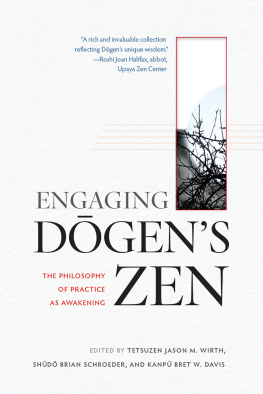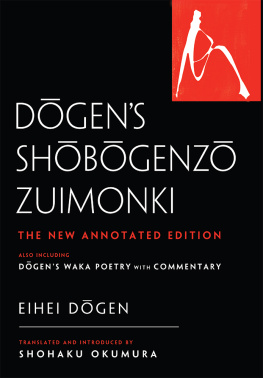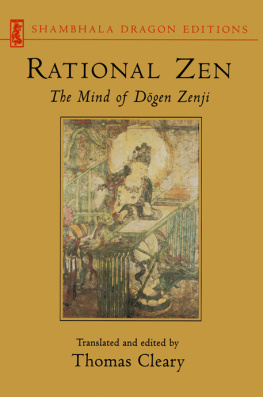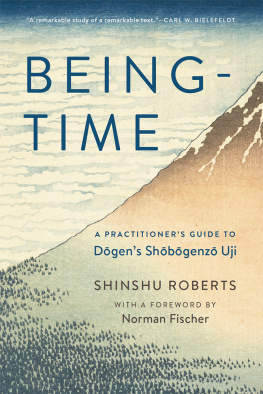
About Wisdom Publications
Wisdom Publications is the leading publisher of classic and contemporary Buddhist books and practical works on mindfulness. To learn more about us or to explore our other books, please visit our website at wisdompubs.org or contact us at the address below.
Wisdom Publications
199 Elm Street
Somerville, MA 02144 USA
We are a 501(c)(3) organization, and donations in support of our mission are tax deductible.
Wisdom Publications is affiliated with the Foundation for the Preservation of the Mahayana Tradition (FPMT).
Acknowledgments
The editors would like to express our gratitude to Josh Bartok, Tony Lulek, Ben Gleason, Laura Cunningham, and all of the other hard-working and generous people at Wisdom Publications who helped bring this volume to the light of day. We would also like to thank Nathan Wirth for the use of his beautiful photographs and Kobayashi Rshi for his teaching and for his CoZen calligraphy. We are especially grateful to Ksh ITAGAKI for his teaching and for inspiring this project. Finally, we would like to thank all of the contributors for their generous, patient, and insightful work on behalf of this volume and on behalf of the Dharma more broadly. May all beings flourish.
Zen Master Dgen is widely regarded as one of the worlds most remarkable spiritual thinkers; his influence on both Japanese and Western Zen Buddhism cannot be overstated. Dgens writings, emphasizing the nonduality of practice and enlightenment, are profoundly subtle, endlessly sophisticatedand renownedly challenging to read on ones own.
This unique collection of essays opens up for the reader new pathways for connecting to and making use of Dgens powerful teachings. Some of Zens leading scholars and practitioners offer a masterfully guided tour of Dgens writings, organized around two key texts: Shushgi, which is a classical distillation of Dgens teachings, and Fukanzazengi, Dgens universal instructions for Zen meditation. Along the way, the reader will gain an enriched understanding of Zen practice and realization, of shikantaza or just sitting, and of the essence of Mahyna Buddhismand a much deeper appreciation of this peerless master.
Contributors
Steve Bein
Kanp Bret W. Davis
Steven DeCaroli
Tenshin Charles Fletcher
Steven Heine
Ksh Itagaki
Leah Kalmanson
Drew Leder
Taigen Dan Leighton
Tetsuun David Loy
John C. Maraldo
Glen A. Mazis
Jien Erin McCarthy
Graham Parkes
Dainen David Putney
Shd Brian Schroeder
Michael Schwartz
Mark Unno
Tetsuzen Jason M. Wirth
Join Wisdoms mailing list and find out what to read next!
Receive the latest news and updates from Wisdom, including new releases and special offers.
Click here to sign up.

Reflections on Dgens Practice
and Philosophy
KSH ITAGAKI
INTRODUCTION
These four themes, called the Four Main Principles (Yondai Kry), along with their introduction, have been at the heart of St teachings since 1941. However, possibly because these teachings were meant for lay followers, the practices taught in Shushgi have not included the one practice, shikantaza (wholehearted engagement in zazen meditation), which was absolutely central to the founder of the St school, Eihei Dgen. From the time of the original assembly of Shushgi, the principal criticism that Shushgi does not faithfully transmit the essence of Dgens teachings has persisted. For these reasons, the Sacred Teachings of Dgen Zenji (Dgen ZenjiSeikun) (1924), edited by Dr. Nukariya Kaiten, has a fundamentally different emphasis than that of the current Shushgi.
Moreover, the teachings of Keizan Jkin Zenji (12681325), the second founding father of St Zen,based on Keizan Zenjis seminal work, Denkroku (The Transmission of the Light). There is also a second work drawn from Keizan, namely, the Denk Sokun (The Teachings of the Transmission of the Lamp Patriarch), compiled by Shk Mitsuo. From these works we can see that Shushgi is far from a complete exposition of the teachings of the St sect. Possibly because it lacks any discussion of zazen, few Zen practitioners in the West bother to read it. Indeed, few even know of its existence. Nevertheless, Shushgi is significant because it can still act as an introduction to some but not all of the important teachings found in Dgens Shbgenz.
Accordingly, we here at Eishji in Seattle have decided to assemble critical editions of Shushgi in the context of the teachings of the St school. First of all, we planned to conduct an examination of the English version of the current Shushgi included in the St School Scriptures for Daily Services and Practices published by the St Head Office. This plan has come to fruition in the present volume. In the future, we hope to expand upon this work by also taking into account the role of Keizan by examining the Addenda to the St Zen FellowshipShushgi compiled by Kikuchi Daisen Rshi. Finally, we would like to produce a new Shushgi that speaks more directly to the needs of contemporary practitioners in the West both without ceding anything essential to New Age practices of Buddhism and while avoiding the restrictions imposed by the historical and political exigencies of the St school during the Meiji era.
This final aspiration, namely, to create a new Shushgi for a new time and a new context, will be a difficult task. This is because the St Fellowship has traditionally held a common evaluation of the worth, meaning, significance, and functioning of Shushgi for roughly a century. Although Shushgi is largely unknown in the West, it has almost universal acceptance by the St Fellowship of Japanese followers. Despite this, it has all too easily rigidified through time. Even though scholars have made small changes in the text, it remains basically the same as the original version. There seems to be little room for flexibility in this context. Moreover, the traditional and most basic economic foundation of Japanese St temples remains the highly profitable funeral business. Also, since the Edo period (16031867), temples remain in the family This temple system became the established order and was not easily changed. This temple plan and the community of St temples has and continues to have a large influence on the prevailing St fraternity, increasing its rigidity so that any flexibility it might once have had has basically evaporated.
Contemporary Japanese Buddhist Institutions
Two special features of contemporary Japanese Buddhist institutions are funeral Buddhism and temple inheritance. The former was established during the Edo period The custom of temple funerals arose from this requirement. Previously, funerals were held under the direction of the village headman. This was because temple funerals were traditionally held only for monks or nuns there was no tradition of lay funerals. The ceremonies used for monk funerals consequently had to be adapted to create a new lay funeral ceremony.
Having undertaken jukai (the acceptance of the Mahyna precepts) was a prerequisite for receiving a temple funeral. This would not have been a problem for monks or nuns, all of whom were required to accept the precepts as a matter of course, but it posed a problem for laypeople, most of whom had rarely even considered accepting them. For those who had not taken them when alive, it became necessary to take them after death, and this became a new part of the funeral, thus further distorting established monastic ceremonies.
Next page










